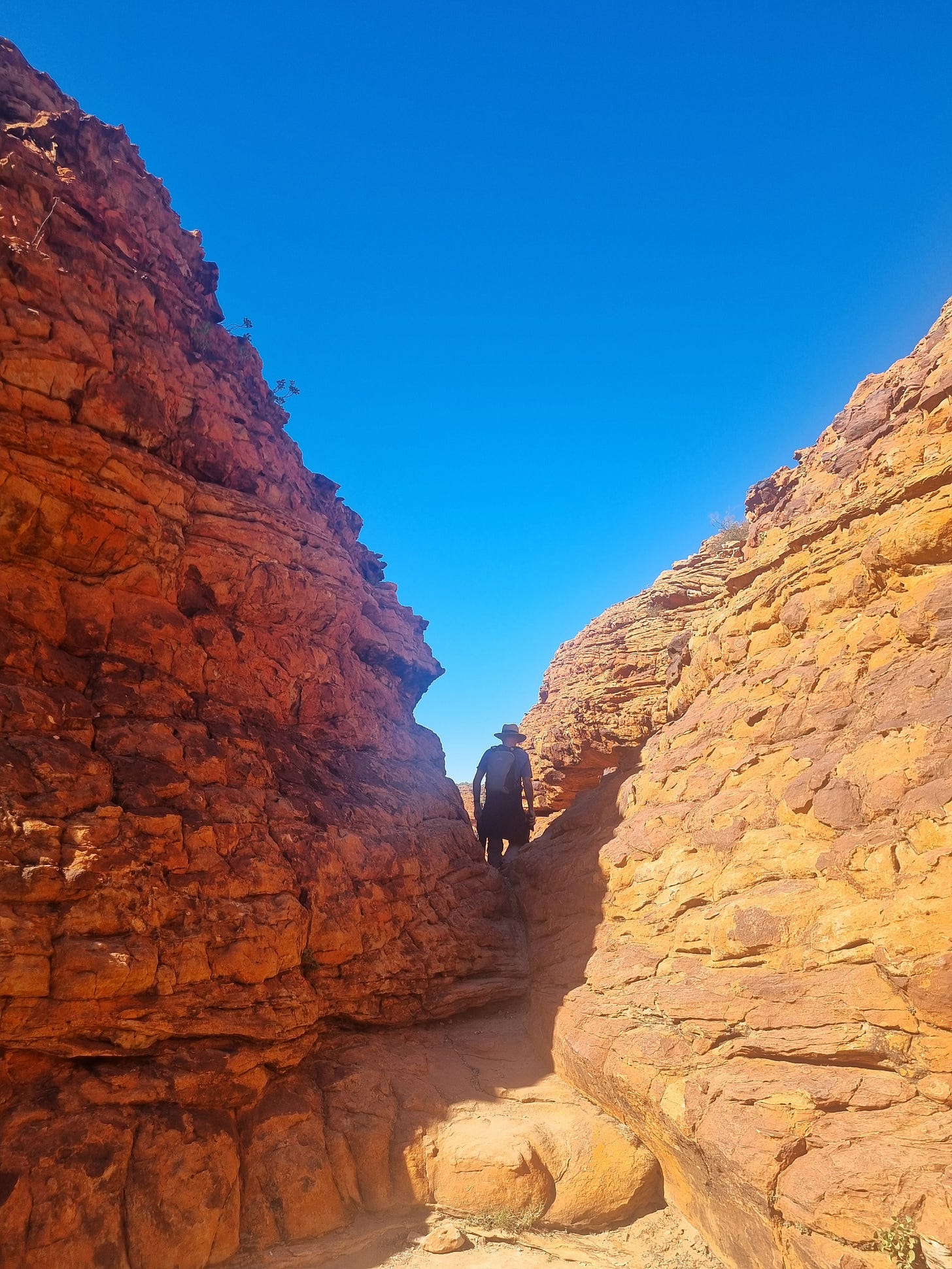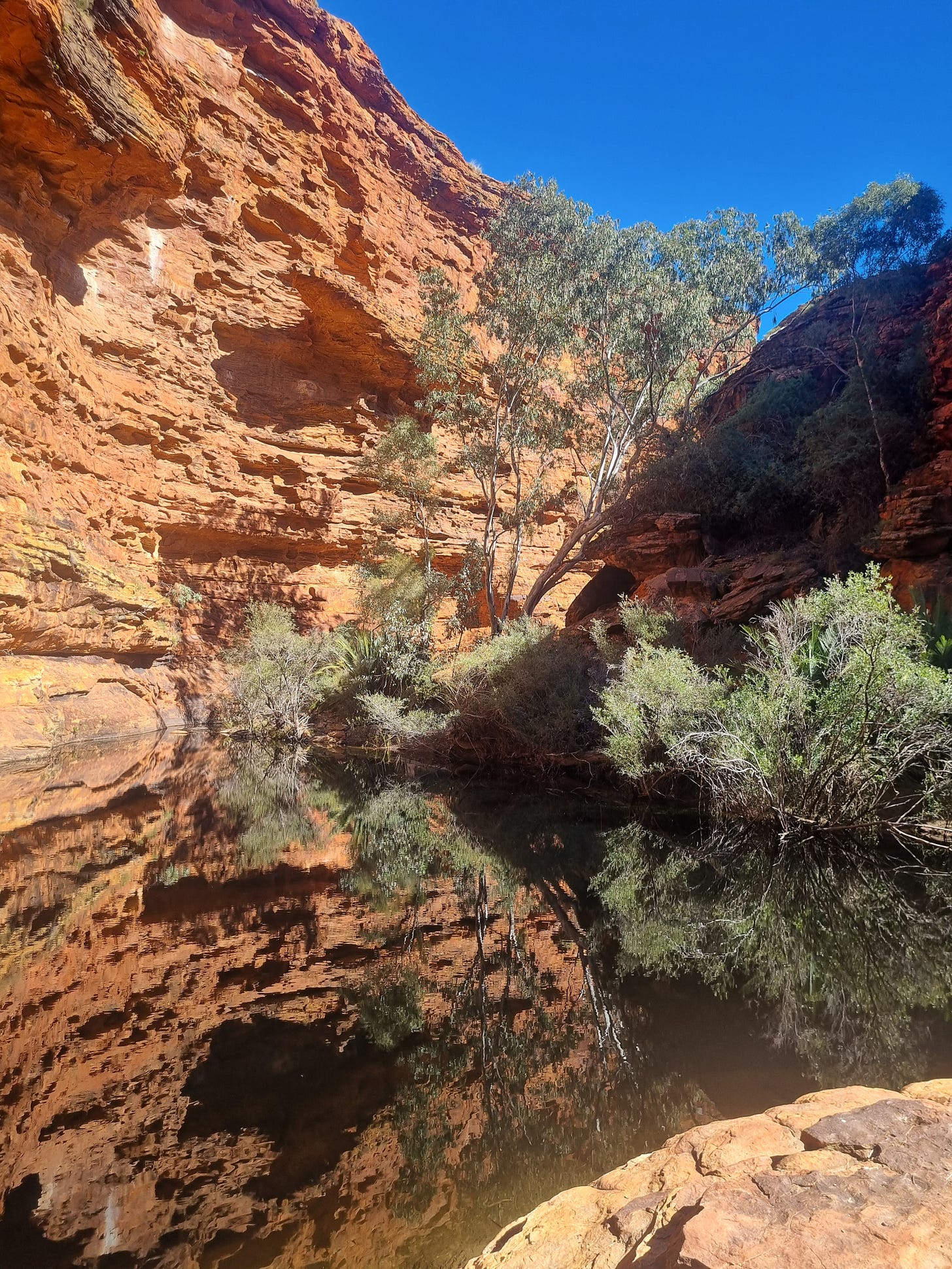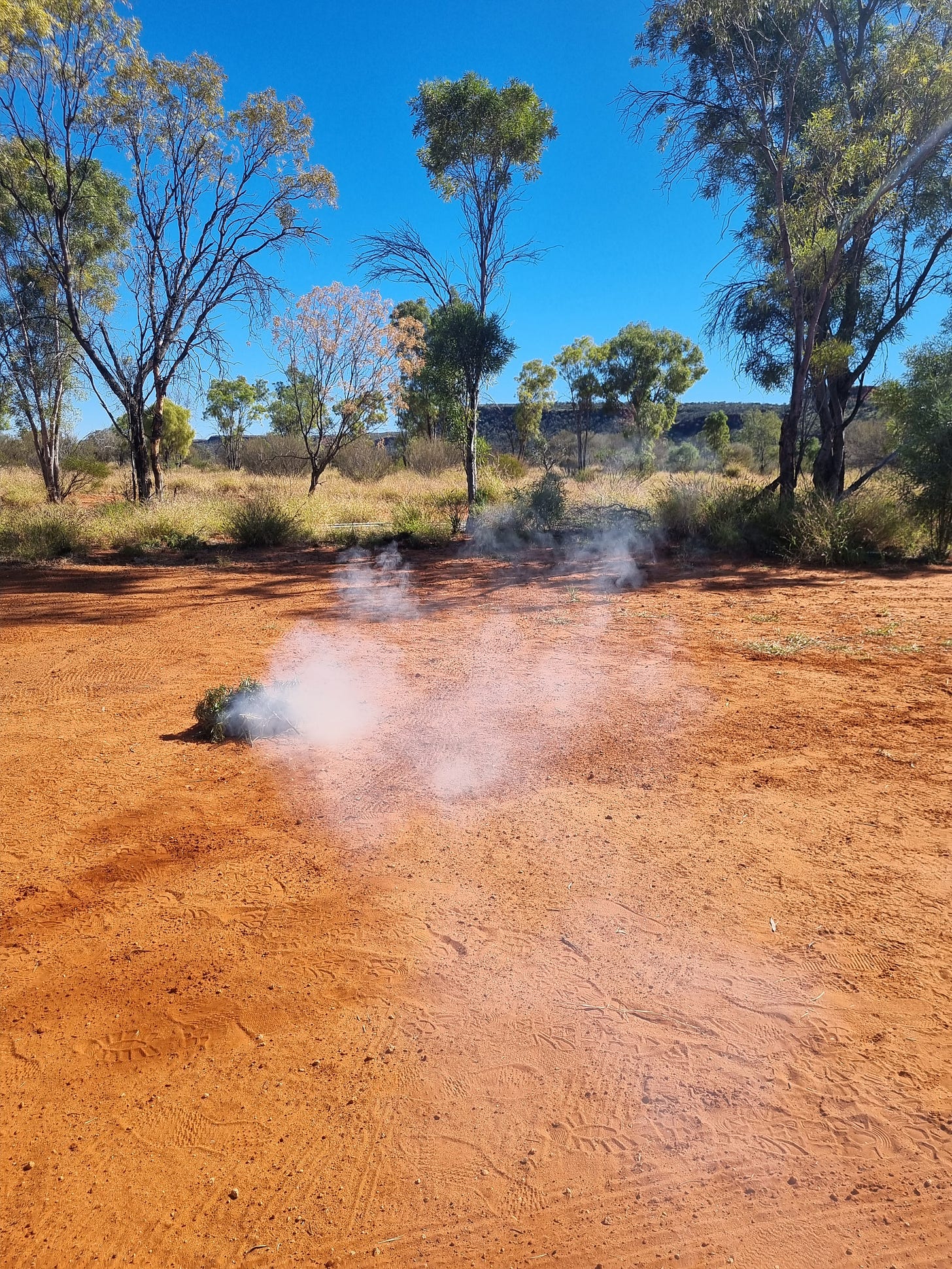We’ve been in Australia for two and a half months now. It’s been harder to talk with trees here, and even more difficult to find the time to write. A fall out from ‘van life’ perhaps. One would think one would have more time, not less, for these endeavours. What makes it so hard to write when on the road?
Currently we are in Alice Springs. We have extended our stay here twice – from 4 days, to 6 days, to a week. There’s so much to see and do. Alice is a service town but also a tourist town. I have an urge, an obligation you could say, to contribute to the economy. This relates to a crisis of meaning that happens to me when I travel. I feel as though I am floating, drifting in on the lives of the local inhabitants. I’m an observer, not part of this place. I feel the need to have a purpose, to be useful. This never happens to a tree of course, trees are inherently part of the place in which they grow and their purpose, meaning and ‘usefulness’ is inherent. Well, for some…indigenous trees are naturally adapted to their environment and mutually networked with the other species in their vicinity. What about ‘imported’ trees – colonisers, immigrants of the plant world? Even they must ultimately adapt and become part of the mutual support system, as they are not going anywhere. Unlike people, who may come and go.
Alice has many nationalities among its human population. According to the 2021 census, a large proportion of the population was born overseas, with 60 different countries represented. People come here for a mix of reasons. This is a significant regional centre with a range of employment opportunities - service industries including health care, welfare, education, farming support, the mining industry and defence (more about this later). Many are drawn to the unique outback lifestyle, and the vibrant arts and cultural scene. It’s an alluring place, as attested by our own extension of time here.
The desert has a special charm that’s impossible to describe if you haven’t experienced it. It’s surprisingly full of life, and the sense of a spiritual connection between all things is unavoidable. Life is lived on the edge here. The natural world is so awesome and geologically present that humans somehow take a back seat. We are forced to accept that we are part of nature, dependent on the natural world for water, sustenance, economy. A mere blip on the landscape.
We can’t experience Alice without acknowledging the First Nations people of the area. The Arrernte people have a rich history with this ‘country’, known as Mparntwe in their language, stretching back 30,000 years. Their stories describe the creation of the landscape by ancestral beings. These stories are embedded in this landscape, in its features, the cracks and crevices on rock faces, the waterholes and the landforms. The very being of these people is intertwined with the land and the creatures and plant life found here. They are inextricably of this place.
While the Arrernte people continue to play a vital role in the community life and environment of Mparntwe/Alice Springs, there is trouble in paradise. I am all too aware that I am unable to get even close to understanding or doing justice to the loss and trauma experienced by the indigenous people of this area. Acknowledgement seems trite, and yet necessary when visiting or writing about this place. The depth of the spiritual connection of the Arrernte people to this country, and the enormity of the disconnection wrought upon them by the arrival of the European colonisers a mere 150 years ago is unimaginable.
All of this prehistory, history and current life is swirling around in my mind, body and soul as I dwell in the arid yet rich landscape of outback Australia. There’s more too. The outside world is making its presence known through the news, snippets from fellow travellers, friends and family, even Substack, or perhaps especially Substack, given how intimately connected we become with our fellow Substakians (is that a word?) We are no longer just of a place, we are party to the whole global mishmash of political goings-on, war mongering, climate change and insect collapse, social media blah blah, caught in the crossfire of it all like startled possums in the headlights of the collapsing world around us.
And then, while doing some research for this post, I find that a few kilometres from where we are staying in a quiet leafy caravan park on the outskirts of Alice, there is perhaps the most important United States intelligence facility outside that country. Pine Gap is a joint US-Australian satellite ground control and processing station that plays a crucial part in US intelligence gathering, enabling the US military to locate targets for various operations including special forces and drone strikes. Pine Gap has supported every US war since the Iraqi invasion in 1991. Oops and then I read, given its importance to US intelligence and surveillance, Pine Gap is considered a potential target in times of conflict. Are we safe anywhere?
And meanwhile, here we are, trying to be good tourists, supporting the local economy. We hear that Alice has lost tourists since covid, exacerbated by a negative reputation related to crime and curfews, largely blamed on the indigenous population and their relationship with alcohol (understandable in the context of colonisation). We haven’t seen or experienced any of this – it’s all been benign and easy. We have seen the local Aboriginal people in the town and were approached by one man, similar to what might happen in downtown Auckland. My overall feeling is one of wanting to help, but not really knowing what to do. We visit the sights, spread around our tourist dollars. We focus on supporting tourist initiatives run by the local people and have purchased some locally made craft. It feels token but we do what we can.
Eventually we feel tourist fatigue and need to stop, re-group, do the washing, check the tyre pressures, re-stock our supplies. So many layers to this complex civilisation modern man has created. No wonder I’m struggling to write. My head is spinning with it all.
And what about the trees? Yes, I have managed to talk with a few. A stunning ghost gum in Kings Canyon was willing to engage. When I stopped nearby, I felt welcomed. I ventured closer, the invitation was palpable. I wrapped my arms around the beautiful white smooth bark and lay my head against its trunk. A vast sense of peace, beauty and love flooded through me. It felt healing, grounding. I stayed a while, hugging the tree. I looked up into the branches and leaves above, painting their patterns on the brilliant blue sky of the Australian outback. I checked it was ok to take a photo. It was.
I asked if the tree had anything it wanted to say to me, any messages for us humans? I knew it saw a lot of us, threading past on the trail around the rim of the canyon in a steady stream. Stop, the tree said, just be. Of course, I’ve heard this before from ‘my’ Waiheke tree. Many trees seems to have a similar message for us. It makes sense, we struggle to ‘just be’ in our modern crazy lives. I shared my concerns about humanity and our future on the planet, what we are doing to each other, other species and the natural environment. The tree indicated a small sapling growing beneath it, and its neighbour, another graceful ghost gum. A clear message came: Nurture the young, seek companionship. All is provided when in balance. Thank you I said. It’s a pleasure, the tree said, go well.
I reflected on the tree’s words as we walked on. The hot mid-winter desert sun was reaching its peak and I needed to concentrate on the rocky path beneath my feet. All is provided when in balance. How do we achieve this when the powers that be are so dominant and controlling of our everyday lives? Even when we think we’re safe in the remote desert, there’s a satellite surveillance and missile attack station just down the road. I don’t know the answer, but I do know that we are not living in balance and therefore all is not provided. Unlike the Arrernte people who lived in harmony with this very land for 30,000 years.
I have a glimmer of a vision. This civilisation we find ourselves in is likely to collapse. Perhaps we can start to do things differently in anticipation, learn from the ancestors and the trees. Nurture and protect our young, get to know our neighbours, build community, collect water, grow veges. Sounds a bit like my grandparents’ and great grandparents’ lifestyle. We might have to get chickens and a milking cow or at least find friendly neighbours we can trade with when we get back home! I jest but you know what, this could be deadly serious.








Beautiful Jackie, and I love your images. Such a distinctly Australian colourscape! Mānawatia a Matariki from across the ditch ✨
Thank you for writing so beautifully about Mparntwe. I've just returned to the east coast after almost two and half years living and working in Mparntwe. Beautiful place and beautiful people. It breaks my heart to hear the negative press and silence.